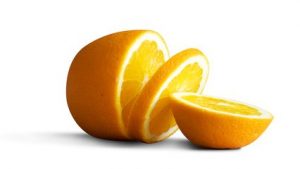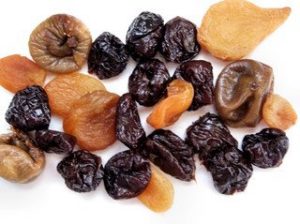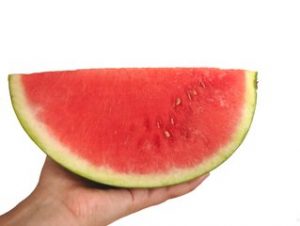This past Shabbat brought a certain amount of stress with it. Why would a day of rest, away from work, phones and technology, bring stress? We were looking forward to guests for Shabbat lunch and this was exactly the source of the stress. You see, one of our guests recently wrote a newspaper article about choosing the right watermelon. Would my watermelon be up to his very high standards?
Fruits play a very important role as an integral aspect of our overall diet. We know that people who eat an abundance of fruits and vegetables substantially reduce their risk of many diseases. Fruits provide nutrients vital for health and maintenance of the body. Now that it is summertime, the great selection of fruits in season seems almost never ending. Taking advantage of that can mean better health and feeling a lot more energetic, too.
The nutrition in fruit
The United States government sponsored site MyPlate does an excellent job in describing all of the nutritional benefits of eating fruit:
- Most fruits are naturally low in fat, sodium, and calories. None have cholesterol.
- Fruits are sources of many essential nutrients that are generally under consumed, including potassium, dietary fiber, vitamin C, and folate (folic acid).

- Diets rich in potassium may help to maintain healthy blood pressure. Fruit sources of potassium include bananas, prunes and prune juice, dried peaches and apricots, cantaloupe, honeydew melon, and orange juice.
- Dietary fiber from fruits, as part of an overall healthy diet, helps reduce blood cholesterol levels and may lower risk of heart disease. Fiber is important for proper bowel function. It helps reduce constipation and diverticulosis. Fiber-containing foods such as fruits help provide a feeling of fullness with fewer calories. Whole or cut-up fruits are sources of dietary fiber; fruit juices contain little or no fiber.
- Vitamin C is important for growth and repair of all body tissues. It helps heal cuts and wounds, and keeps teeth and gums healthy.
- Folate (folic acid) helps the body form red blood cells. Pregnant women should consume adequate folate from foods, and in addition 400 mcg of synthetic folic acid from fortified foods or supplements. This reduces the risk of neural tube defects, spina bifida, and anencephaly during fetal development.
Health benefits from fruit
It is easy to see that you can many important nutrients from tasty choices. MyPlate also tells us some of the great health benefits of eating fruits on a daily basis:
- Eating a diet rich in vegetables and fruits as part of an overall healthy diet may reduce risk for heart disease, including heart attack and stroke.
- Eating a diet rich in some vegetables and fruits as part of an overall healthy diet may protect against certain types of cancers.
- Diets rich in foods containing fiber, such as some vegetables and fruits, may reduce the risk of heart disease, obesity, and type 2 diabetes.
- Eating vegetables and fruits rich in potassium as part of an overall healthy diet may lower blood pressure, and may also reduce the risk of developing kidney stones and help to decrease bone loss.
- Eating fruits instead of some other higher-calorie food may be useful in helping to lower calorie intake.
Preventing heart disease and type 2 diabetes
The vitamins, minerals and antioxidants in fruit may help keep your heart healthy so you can reduce your risk of problems as you get older.  Walter Willett reports in his book “Eat, Drink and Be Healthy: The Harvard Medical School Guide to Eating Healthy” that individuals who eat five servings of fruits or vegetables are 15% less likely to have a heart attack. Fruit may also promote the healthy circulation of your blood, which also reduces your risk of heart disease. Willett adds that citrus fruits, such as oranges and grapefruit, may be particularly beneficial at reducing your risk of heart disease.
Walter Willett reports in his book “Eat, Drink and Be Healthy: The Harvard Medical School Guide to Eating Healthy” that individuals who eat five servings of fruits or vegetables are 15% less likely to have a heart attack. Fruit may also promote the healthy circulation of your blood, which also reduces your risk of heart disease. Willett adds that citrus fruits, such as oranges and grapefruit, may be particularly beneficial at reducing your risk of heart disease.
Type 2 diabetes affects many people and is characterized by an inability to use insulin the proper way with insulin resistance or not being able to produce enough insulin. Type 2 diabetes can be life-threatening if not diagnosed and treated. A 2016 review article published in Journal of Diabetes Investigation found that fruit, especially berries, was linked to a decreased risk of developing type 2 diabetes. Fruit contains fiber, which can improve how your body uses insulin. It can also make you feel full, which can keep you from eating unhealthy foods and may result in weight loss. Fruit contains many different nutrients that your body needs to maintain your health. Eating several servings a day may cut your risk by providing you with the vitamins and minerals you need.
Selection and Storage of fruits
- Choose in-season fruits. The closer you are to the growing source, the fresher your produce and the better it tastes.
- Select fruits that feel heavy for their size. Heaviness is a good sign of juiciness.
- Smell fruits for characteristic aromas. Fruits should generally have their characteristic ripe scent but not smell overly ripe. For example, melons both orange and green, shouldn’t smell too musty, especially if you don’t plan to eat it right away.
- Test texture. An apple that feels mushy to the touch probably is too ripe. However, an avocado with a somewhat spongy texture is ideal.
- Buy dried fruits processed without added sugar. Dried fruits are a concentrated source of dietary fiber but are also higher in calories than are fresh fruits. Use dried fruits sparingly and buy ones that don’t contain added sugar.

- Read labels on packaged fruits. Look for frozen fruits processed without added sugar. Choose fruit canned in water or fruit juice. Avoid fruits preserved in sugar-sweetened syrup, which is a source of calories without nutrients.
- Keep fruits in your refrigerator after you wash and prepare them for eating. Refrigerate sliced fruits or sections of fruit. Don’t store melons in the refrigerator until they are cut up.
- Throw away produce you have kept too long. Discard fruit that is moldy or slimy, smells bad, or is past the “best if used by” date.
Now, back to my watermelon. I love watermelon season and I look forward to using it for dessert during my Shabbat meals. It didn’t take long for my stress to melt away.  As I cut open the watermelon, I saw by the color we had a winner and we all agreed it was the best one so far this season. Not only does it taste good, but watermelons are mostly water — about 92%— and full of nutrients. Each juicy bite has significant levels of vitamins A, B6 and C, lots of lycopene, antioxidants and amino acids. There’s even a modest amount of potassium. Plus, this tasty summer snack is fat-free, very low in sodium and has only 40 calories per cup.
As I cut open the watermelon, I saw by the color we had a winner and we all agreed it was the best one so far this season. Not only does it taste good, but watermelons are mostly water — about 92%— and full of nutrients. Each juicy bite has significant levels of vitamins A, B6 and C, lots of lycopene, antioxidants and amino acids. There’s even a modest amount of potassium. Plus, this tasty summer snack is fat-free, very low in sodium and has only 40 calories per cup.
Everyone enjoyed the watermelon. We are all careful to eat fruits daily. BUT BE AWARE! Fruits are high in natural sugar and eating more than 4 per day, if you are an exerciser, or more that 3 a day if you aren’t, can put you over your daily calorie limit. It is also better to eat your fruits throughout the day and not in one sitting. Including fruits as part of a good healthy and balanced diet will “add hours to your day, days to your year and years to your life.”

Leave A Comment